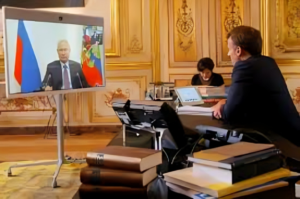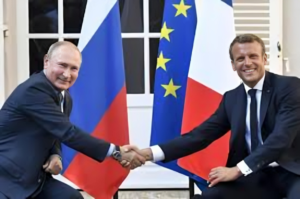First Direct Phone Conversation Between Putin and Macron Since 2022 Marks Diplomatic Shift
In a significant diplomatic development on July 1, 2025, French President Emmanuel Macron and Russian President Vladimir Putin held their first direct phone conversation in over two and a half years. This call, initiated by Macron, covered two pivotal geopolitical issues: the ongoing conflict in Ukraine and Iran’s nuclear program. Their dialogue underscores a renewed, albeit cautious, engagement between Paris and Moscow at a time of heightened international tensions.
Introduction
The hiatus in high‑level communications between France and Russia since August 2022 reflected deep rifts following Russia’s full‑scale invasion of Ukraine. By breaking this silence, both leaders signal a willingness to explore limited channels of dialogue despite their stark differences. For France—a permanent member of the UN Security Council and a key NATO ally—the call represented an effort to leverage personal diplomacy in pursuit of de‑escalation. For Russia, it offered a platform to reaffirm core strategic positions and push back against Western narratives.

Renewed Engagement Amid Protracted Crises
Ukraine: Sovereignty, Ceasefire, and Negotiations
- Support for Ukraine’s sovereignty: Macron reiterated France’s unwavering backing for Ukraine’s territorial integrity, emphasizing that any lasting peace must respect internationally recognized borders.
- Call for an immediate ceasefire: He pressed Putin to agree to an immediate cessation of hostilities, urging both sides to pave the way for meaningful negotiations.
- Path to peace talks: While Putin reaffirmed Russia’s demand for recognition of Crimea and the Donbas regions under Moscow’s control, Macron underscored the need for an inclusive peace process involving Ukraine directly, rather than imposing terms unilaterally.
These points reflect France’s commitment to diplomatic efforts, even as Russia maintains its stance on “new realities” on the ground. The divide over whether Minsk II or a new framework should guide negotiations remains a central obstacle.
Iran: Nuclear Commitments and IAEA Cooperation
- IAEA access and inspections: Macron stressed the urgency for Tehran to resume full cooperation with the International Atomic Energy Agency, enabling inspectors to verify peaceful intentions without delay.
- Right to peaceful nuclear energy: Both leaders agreed in principle that Iran has the sovereign right to develop nuclear power for civilian purposes, provided it abides by the Non‑Proliferation Treaty.
- Regional stability: They acknowledged shared concerns over Middle Eastern security, agreeing to stay in touch on diplomatic initiatives to prevent further escalation.
While Russia continues to supply key components to Iran’s civilian nuclear sector, Western capitals have pushed for stricter oversight. Macron’s appeal blends support for Iran’s peaceful program with calls for transparency—an approach Moscow has tolerated to preserve its own regional influence.
Real‑World Implications and Reaction
Western Unity and Information Sharing
Immediately after the call, Macron briefed Ukrainian President Volodymyr Zelenskiy, a move that highlights France’s effort to maintain coordination with Kyiv and other Western partners. Paris hopes that transparency will reinforce unity within the G7 and NATO, despite concerns in some capitals that direct dialogue with Putin could be misinterpreted as a softening of sanctions.
Domestic and International Responses
- In France: Political factions offered mixed reactions. Pro‑diplomacy voices praised Macron’s assertive engagement, while critics warned against legitimizing Putin’s positions without securing concrete concessions.
- In Russia: State media framed the conversation as evidence of Russia’s return to major‑power consultations, downplaying Paris’s calls for Ukrainian territory to be returned.
- In Ukraine: Zelenskiy welcomed France’s diplomatic outreach but reaffirmed Kyiv’s demand for a full Russian withdrawal before any lasting peace talks could advance.
These reactions illustrate the tightrope Macron must walk: fostering dialogue without undermining the broader Western strategy of pressure and deterrence.

Why This Call Matters
- Breaking the communication freeze: This marks the first direct contact between Macron and Putin since August 2022, reviving a channel that had all but closed after Russia’s invasion of Ukraine.
- Diplomatic flexibility: By engaging with Russia on key security issues, France signals that it remains open to dialogue even amid severe conflict—a stance that could influence other NATO members.
- Leveraging personal diplomacy: Macron’s style of direct outreach aims to build trust at the highest level, potentially laying groundwork for future negotiations on ceasefire and de‑escalation measures.
Despite deep disagreements, maintaining dialogue can help manage crises and prevent miscalculations that might otherwise escalate into broader conflict.
Conclusion
The first phone call between Emmanuel Macron and Vladimir Putin since 2022 represents a cautious but meaningful step in international diplomacy. It underscores France’s dual strategy of firm support for Ukraine alongside pragmatic engagement on issues where shared interests exist, such as nuclear non‑proliferation. Whether this renewed channel will lead to concrete progress remains uncertain, but it reintroduces personal diplomacy into a landscape dominated by sanctions and strategic competition.
As the world watches, creditors of this diplomatic initiative will look for follow‑up actions—both in Paris and Moscow—that might translate words into responsible steps for de‑escalation. For now, the call itself serves as a reminder that even the bitterest adversaries may still engage when stakes are high enough.